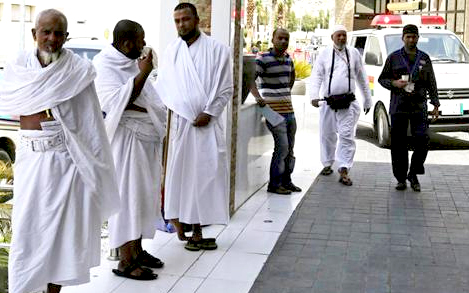Riyadh, Oct 14: Nearly half a million pilgrims made use of medical facilities that were available in Makkah and Madinah during Haj this year. Nineteen open heart surgeries were performed, Mansour Al-Hawasi, deputy health minister for Health Affairs, said here Sunday.
 Al-Hawasi was addressing health officials here during an Eid party hosted by the Ministry of Health to thank health officials who were affiliated with the Haj program in both cities.
Al-Hawasi was addressing health officials here during an Eid party hosted by the Ministry of Health to thank health officials who were affiliated with the Haj program in both cities.
Some 22,000 health officials were deployed in the holy cities this year, as well as at 14 ports of entry.
Offering his congratulations to Custodian of the Two Holy Mosques King Abdullah and Crown Prince Salman, deputy premier and minister of defense, for their unwavering cooperation in making the health program a success, the deputy minister said health officials did their part to offer the very best of services to pilgrims.
He also expressed gratitude to the World Health Organization (WHO) for its assistance in the prevention of infectious diseases.
Shoura Council member Abdul Rahman Al-Sweilem was present during the function.
Al-Hawasi said some 472,000 pilgrims availed themselves of the medical facilities at the holy sites and at the ports of entry.
He said that 329,000 pilgrims had visited medical centers in the holy sites and 111,000 had sought outpatient treatment at these clinics.
"A total of 28,000 pilgrims have sought emergency treatment, while 3,700 were admitted to various hospitals in Makkah and Madinah," he added.
Al-Hawasi pointed out that 19,000 units of blood were used to treat patients at the holy sites so far.
Some 19,000 pilgrims were given on-the-spot medical treatment at various points throughout the holy city.
According to statistics provided by the deputy minister, 988 pilgrims received dialysis treatment, while 330 underwent catheterization and 55 were given endoscopic treatment.
A comprehensive Haj health program was implemented under the leadership of the acting Health Minister Adel Fakeih this year in cooperation with the WHO.
The Health Ministry took preventive measures to combat the spread of the Ebola and the Middle East Respiratory Syndrome coronavirus (MERS-CoV) with the help of local and international medical experts, including officials from the WHO.
This year, the Ministry of Health fielded a total of 22,000 medics and paramedics to look after the welfare of the local and foreign Haj pilgrims in the holy cities of Makkah and Madinah.
In addition to a fleet of 100 ambulances, the ministry has also deployed some 50 mini-ambulances to be able to infiltrate crowded areas to ferry patients to nearby hospitals.
There are 141 primary health care centers, which includes 100 primary health care centers and 17 emergency centers near the Jamrat bridge.
The ministry also set up a central command center to monitor and coordinate with the health officials to serve the pilgrims who fall ill or need medical treatments during their stay in the holy cities.
The center focused on the Ebola virus and MERS-CoV during the pilgrimage.
There are 25 hospitals in the holy cities, including seven in Makkah, nine in Madinah, four in Mina and four in Arafat, in addition to King Abdullah Medical City.
There are a total of 5,250 beds in the holy cities, including 500 beds for ICU patients.






.jpg)
.jpg)
Comments
Add new comment